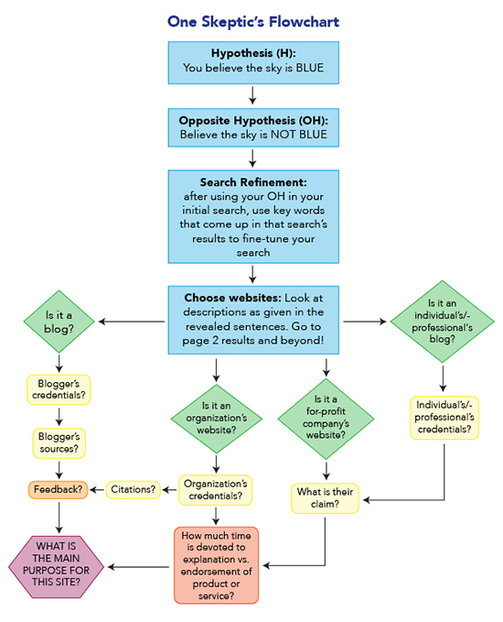Over and over I've said, "Scrutinize your sources" when searching the internet for science/medical information. But how does one truly determine whether or not the site is credible? If you can discern what true motivation lies behind the site, this will give you much insight as to whether or not the site is a credible one.
This flowchart demonstrates the process MY brain goes through when I search the internet. When it comes to finding credible information about diseases/ailments in particular, what determines credibility focuses on several main issues: WHO is authoring the site? WHAT are their credentials/sources/citations for their claims? Is there an ULTERIOR MOTIVE, for instance, a spine clinic/chiropractor trying to convince you to become a patient, or purchase their very expensive nerve stimulation gizmo? What kind of FEEDBACK does this site receive? Has the information been directly copied from another site (I've encountered this often!)? Was that info. then properly cited?
Medical topics are especially difficult because without the basic foundation of biology, chemistry, physiology, or biochemistry, it is very easy to NOT understand holistically how our body is impacted when trying a new treatment. But it doesn't mean you can't logically deduce the credibility of the site, you just have to be prepared to accept another viewpoint if it's well-supported. A number of websites tout treatments based only on anecdotes and testimony. There's a good reason why we have regulations on the medical industry/research, because un-tested treatments can be HARMFUL. Blogs, websites, etc, are NOT always written by credible individuals, nor are their claims backed up by anything other than "It works for me!" I'm not saying it didn't work for that person, but it is simply not enough to make whatever it is a treatment for all, and what's more, side effects can have worse outcomes than the treatments itself. Starting with an opposite hypothesis might make you more critical of what you are reading.
In case you are wondering, I do have my biases too. I'll trust anything that comes out of Johns Hopkins, the Mayo Clinic, the CDC, NIH, FDA, R1-research universities, or any reputable hospital (e.g., MD Anderson or Memorial Sloan-Kettering Cancer Center, for cancer questions). AND, I shamelessly use Wiki to get those all-important key words to help refine my search!
This flowchart demonstrates the process MY brain goes through when I search the internet. When it comes to finding credible information about diseases/ailments in particular, what determines credibility focuses on several main issues: WHO is authoring the site? WHAT are their credentials/sources/citations for their claims? Is there an ULTERIOR MOTIVE, for instance, a spine clinic/chiropractor trying to convince you to become a patient, or purchase their very expensive nerve stimulation gizmo? What kind of FEEDBACK does this site receive? Has the information been directly copied from another site (I've encountered this often!)? Was that info. then properly cited?
Medical topics are especially difficult because without the basic foundation of biology, chemistry, physiology, or biochemistry, it is very easy to NOT understand holistically how our body is impacted when trying a new treatment. But it doesn't mean you can't logically deduce the credibility of the site, you just have to be prepared to accept another viewpoint if it's well-supported. A number of websites tout treatments based only on anecdotes and testimony. There's a good reason why we have regulations on the medical industry/research, because un-tested treatments can be HARMFUL. Blogs, websites, etc, are NOT always written by credible individuals, nor are their claims backed up by anything other than "It works for me!" I'm not saying it didn't work for that person, but it is simply not enough to make whatever it is a treatment for all, and what's more, side effects can have worse outcomes than the treatments itself. Starting with an opposite hypothesis might make you more critical of what you are reading.
In case you are wondering, I do have my biases too. I'll trust anything that comes out of Johns Hopkins, the Mayo Clinic, the CDC, NIH, FDA, R1-research universities, or any reputable hospital (e.g., MD Anderson or Memorial Sloan-Kettering Cancer Center, for cancer questions). AND, I shamelessly use Wiki to get those all-important key words to help refine my search!


 RSS Feed
RSS Feed
